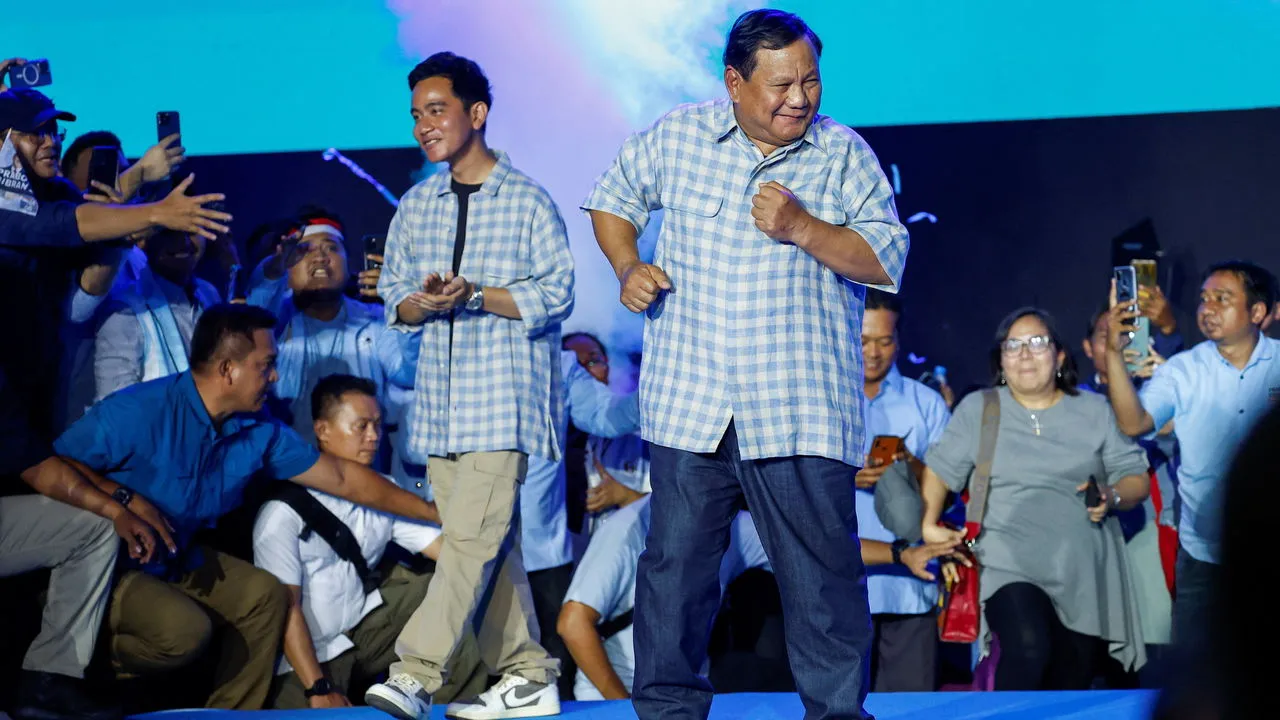Thousands of young Indonesians cheer as Prabowo Subianto dances up onto the stage in Jakarta. Known by his mononym, Prabowo, the friendly figure has been a popular presidential candidate in the world’s third-largest democracy. Many of these Indonesians are too young to know that Prabowo was not always the dancing grandpa he appears to be today. He has rebranded his image to run an effective presidential campaign, taking victory against his opponents on February 14. But behind his groove, Prabowo hides a dark history that should concern anyone who cares about democracy.
Prabowo is an ex-general who served under Indonesian dictator Suharto, who oversaw a brutal 32-year regime that instigated mass killings and crackdowns. As Suharto’s son-in-law, he also held links to a corrupt family with near-absolute power in Indonesian politics and economics. Prabowo himself was dismissed from the military when Suharto was ousted in 1998, owing to his role in the abduction and torture of democracy activists. He was also notorious for leading the crackdown and massacre during the Indonesian occupation of East Timor.
Never far from power, Prabowo has sought power in Indonesia to consolidate his place in post-Suharto Indonesia since his dismissal from the military. He questioned the need for democracy in the past and became known for his volatile temper. After losing the last two elections to Indonesia’s outgoing president and main rival, Joko Widodo, he claimed false victory amongst his supporters. Joko Widodo, better known as Jokowi, was extremely popular among Indonesians for his economic reforms as a man of the people.
However, in Jokowi’s second term, he oversaw democratic backsliding by weakening institutions such as the Anti-Corruption Commission, allying with Indonesia’s political elites, and positioning his son to be Prabowo’s vice-president. Jokowi appointed Prabowo as his defense minister in 2019, effectively co-opting his opponent to the irritation of his own party. In doing so, he gains powerful allies in Indonesia’s military and economic elite, a strategy that may allow him to retain power and relevance after his term ends. The controversial move may backfire, however, if Prabowo no longer sees a need for his backing. Jokowi’s risky final power grab poses a risk to his legitimacy, but his influence remains far greater than any Indonesian leader right now.
Prabowo’s campaign gained traction mainly because of his rebranding. Now a Jokowi ally, he has promised to continue many of Jokowi’s economic policies and remain committed to sustaining Indonesia’s democracy. While these promises may offer comfort to Prabowo’s young voter base, it is impossible to forget his tarnished legacy, repeatedly downplayed by himself and his supporters. This unexpected rise to power has coincided with a gloomy outlook for what was one of Asia’s youngest and most vibrant democracies.
While he may continue to operate under Jokowi’s larger economic plans, his hot temper and lust for power will tempt him to step out of that shadow and create political instability. Prabowo’s links to Suharto already created a wave of political nostalgia among young Indonesians online, in a misguided longing for ‘better times’ during the regime of one of the most corrupt and ruthless world leaders in recent history. Suharto and his family have embezzled an estimated $30 billion from the Indonesian people. These are worrying signs that reflect a global trend of rising authoritarianism and a disdain for democracy, coupled with a lack of awareness of the past. Many in Indonesia may want a strong leader who can take action, forgetting that such strongmen can be responsible for immense suffering.
In the two-and-a-half decades of Indonesia’s newfound democracy, it has built the potential to become one of Asia’s most influential countries. It has a combination of a young, working-age population, steady economic growth, and large industrial production. It is the world’s fourth-most populous country and a young one. Only 7% of its 276 million people are over 65. Despite Indonesia’s nearly 20,000 islands, nearly three-quarters of its people are connected via the Internet, creating a huge consumer market with significant collective power. This new freedom could be undermined under Prabowo’s authoritarian past.
Alongside its people, Indonesia’s economy has also grown into one of the world’s largest. Though past presidents’ promises of 7% annual growth have not been met, it has remained one of the world’s best-performing economies. People are more wealthy, but inequality remains prevalent. Indonesia’s Gini coefficient, a measure of income distribution, was measured at 0.409 in March of 2023. While Prabowo has promised to maintain this level of prosperity, it is impossible to continue this level of performance forever. At home, Indonesia will have to expand its industries to put economic growth on more diversified and sustainable foundations. Abroad, the resource and population-laden landscape has come into the crosshairs of the global rivalry between the US and China. Strongman Prabowo’s volatile temperament and authoritarian leanings will likely destabilize these national projects.
Prabowo’s victory does not necessarily mark the downfall of liberal politics in Indonesia. His 200 million voters are still banking on him to deliver on his commitment to democracy. Others remain optimistic about Indonesian democracy as a whole. Ultimately, it is hard to ignore his past, a worrying indicator of what he may do to democracy in the future. Beyond that, Prabowo’s rise represents a relapse of cronyism, corruption, and anti-democratic norms that Jokowi was meant to stamp out. Instead, Jokowi leaves office with a waylaid path of clinging onto power, and Prabowo fulfills a longtime ambition to seize control. Only time will tell if Prabowo has truly forsaken his horrid past and become a fun-loving, democratic grandpa. Unfortunately, all signs point to a difficult test of Indonesia’s democracy.
Feature Image: Reuters






Comments are closed.